Albania has long been a pro-Israel country. Will the Hamas war change that?
Albania is known as the only European country that had more Jewish residents after World War II than before it
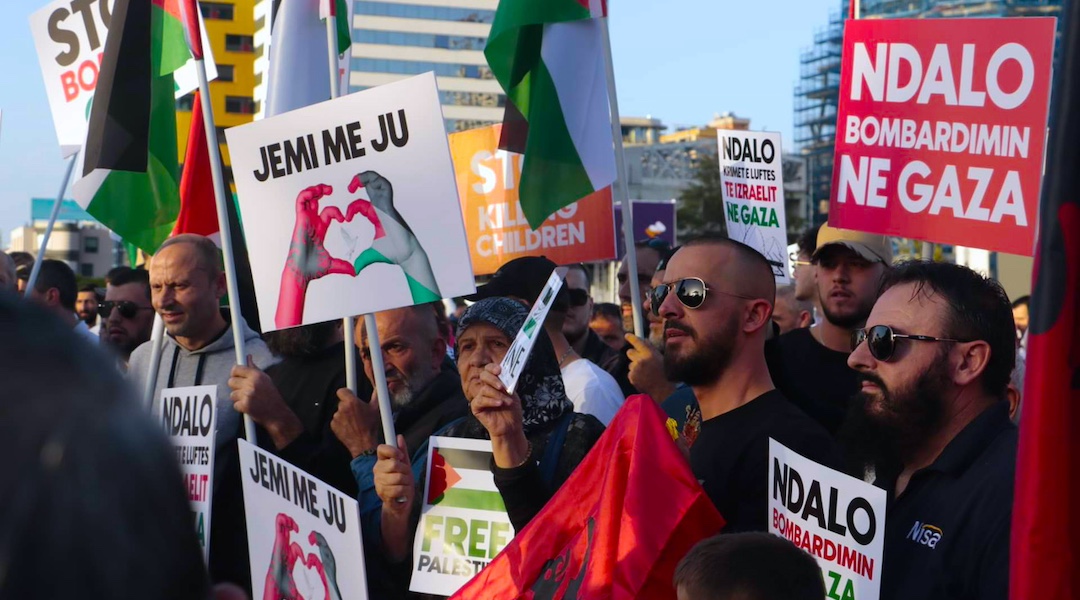
Pro-Palestinian activists protest Israel at a rally at Skanderbeg Square in downtown Tirana, Albania, Oct. 20. (Courtesy of Diana Mjeshtri)
TIRANA, Albania (JTA) — Hidden behind a wooden gate in Tirana’s Toptani district, construction workers are busy converting a 19th-century Ottoman mansion into the Besa Museum — a long-planned shrine to Albania’s embrace of Jews fleeing Nazi persecution during World War II.
About 100 miles south, in the Adriatic port city of Vlora — nestled among trendy cafés along a cobblestoned street where Jews once lived — a multimedia museum designed by Tel Aviv-based architects will soon portray the richness of Albania’s Jewish history, from the Spanish Inquisition to the Holocaust.
The building of one, let alone two, such museums in an impoverished Balkan country that’s home to more than a million Muslims but only about 60 Jews is a remarkable turn of events. The Marxist regime that ruled Albania from 1946 to 1991 outlawed all religions in 1967 — including Judaism — and reviled Israel as the “little devil” of the United States.
But Albania is also known as the only European country that had more Jewish residents after World War II than before it. In recent years, officials have looked to promote that narrative and cultivate ties with Israel. The story stems, in their view, from their nation’s culture of “besa” — Albania’s medieval code of honor, which requires people to welcome any guests, including foreigners, as their own.
“The rescue of the Jews during World War II is one of the most beautiful pages in the history of the Albanians. Christians and Muslims sacrificed everything to protect them,” said Elva Margariti, Albania’s minister of culture, when announcing the Besa Museum earlier this year. “For Albanians this is besa. It is a value that we will pass on to our children, telling them this extraordinary story.”
Albania’s warm feelings toward Israel will be tested in the weeks and months to come. Pro-Israel sentiment is already dropping in the wake of Israel’s war against Hamas in Gaza, which was sparked by the terror group’s bloody incursion into southern Israel on Oct. 7.
An online survey of Albanians conducted Oct. 13 by Tirana pollster Eduard Zaloshnja showed relatively strong sympathy for Israel in the war’s first week. Of the 2,320 people who responded to what Zaloshnja concedes was a “quick and dirty, not scientific” questionnaire, 50% said they were pro-Israel, 36% identified as pro-Palestine and 14% said they were “undecided.”
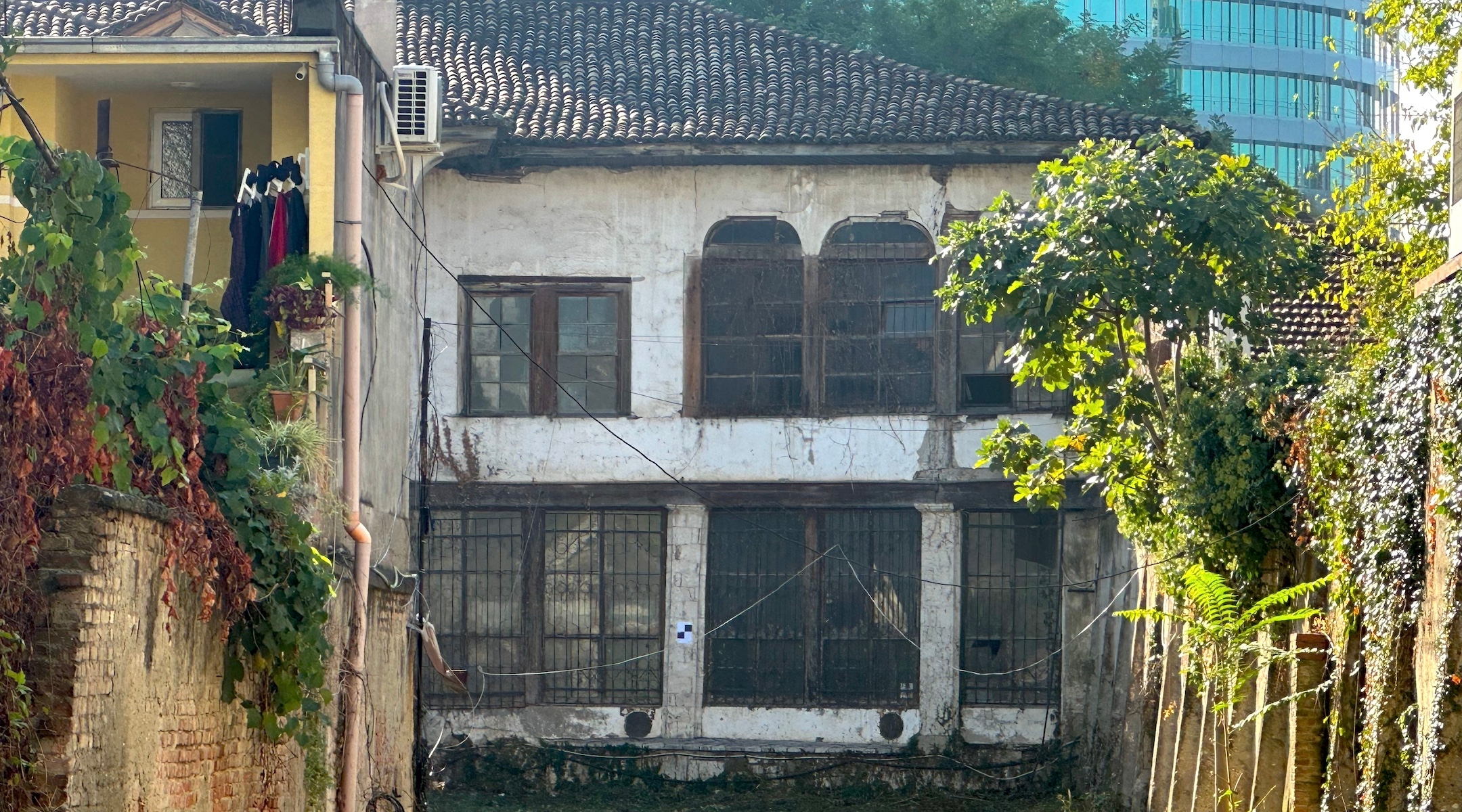
This Ottoman mansion in Tirana’s Toptani district is being converted into the Besa Museum — a shrine to Albania’s tradition of welcoming Jews and other foreigners. (Larry Luxner)
However, support for Israel has since fallen, Zaloshnja said, especially since an explosion at a Gaza City hospital that Hamas immediately blamed on Israel. Video and other evidence have led to the widespread assessment that the blast, which may have killed hundreds, was caused by a misfired rocket launched by the Islamic Jihad terror group.
On Oct. 16, the United Nations Security Council rejected a resolution that condemned Israeli airstrikes on Gaza and demanded an immediate ceasefire. Five countries including China and Russia voted in favor while four — the United States, France, Germany and Japan — voted against it because the resolution failed to specifically condemn Hamas. Albania, which currently has a seat on the body, was one of six countries to abstain.
Two days later, Albanian Prime Minister Edi Rama tweeted that although “Hamas is a cancer in the body of humanity,” there’s no excuse for “turning a blind eye” to the Israeli response.
“In this conflict, Albania and the entire democratic world stand firmly on the side of Israel, barbarically targeted by the depravity of Hamas terrorists!” wrote Rama, whose party is often described as center-left. “However, the democratic world must also be a guarantor of the truth and the justice for the hundreds of victims of the bombed hospital in Gaza.”
On Friday, hundreds of Albanian Muslims converged on Skanderbeg Square, Tirana’s main plaza, shouting pro-Palestinian slogans and waving “Free Gaza” placards.
“I’m reading comments on Albanian social media accounts that local Islamists are inundating with conspiracy theories,” said Zaloshnja. “My personal feeling is that there’s an older generation of Albanians who were indoctrinated by hatred toward Israel and support for the Palestinian cause. That generation is still alive.”
A Jewish community scattered
In 1991, Albania’s Marxist regime collapsed, in a year that marked the end of communism in Eastern Europe. The new democratic government immediately established diplomatic relations with Israel, but it took another 21 years for an Israeli embassy to open in Tirana.
Today, Albania has three honorary consuls in Israel: one responsible for Tel Aviv, Jerusalem and the central region; another in Haifa, covering northern Israel; and a third in Eilat for southern Israel and the Negev. Some 54 Israeli companies currently operate in Albania, including drip irrigation firm Netafim, and the Balkan country has become a popular destination for Israel tourists, with seasonal nonstop flights linking Tel Aviv and Tirana.
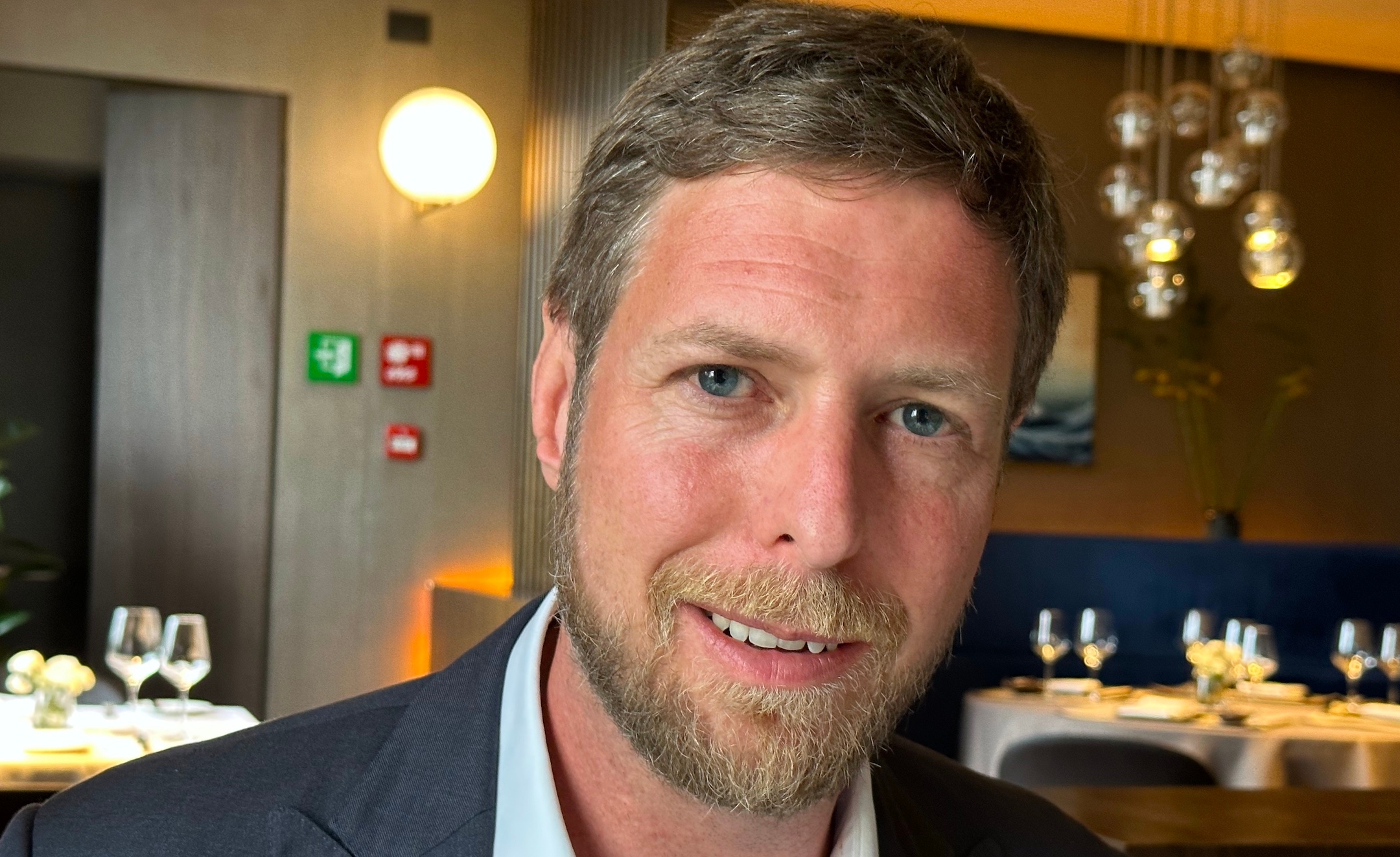
Prince Leka II is the grandson of Albania’s King Zog, who was widely credited with welcoming Jews fleeing Nazi persecution. (Larry Luxner)
But Albania has another, more complicated side to its history and its ties to the Middle East. Terrorists belonging to the Palestine Liberation Organization used to train in Albania for six months of guerrilla warfare at a military base in Zall-Herr, just north of Tirana. More recently, between 50 and 60 Albanians — mostly from very poor villages in the southeast — were recruited to fight for ISIS.
News articles often portray Albania as a majority-Muslim country, but the reality is more nuanced. About half of Albania’s 2.6 million inhabitants don’t identify with any religion, a legacy of the atheism imposed by Enver Hoxha, who ruled the country from 1946 until his death in 1985. Of those who do, roughly 50% are Bektashi — an Islamic Sufi mystic order — while 21% practice traditional Islam and the remaining 29% consider themselves Christian Orthodox or Catholic.
The Jewish presence in Albania was always tiny. Before World War II, Albania was home to perhaps 300 Romaniote Jews — a Greek-speaking ethnic community. Most of them lived in Vlora, with a smaller community in Tirana and scattered Jewish families in other cities and towns.
At its peak, perhaps 3,750 Jewish refugees from Greece, Austria, Bulgaria, Italy and the former Yugoslavia lived in Albania. Some Jews fought as partisans against the Nazis, and their memories are honored in a special exhibit at Albania’s National History Museum fronting Skanderbeg Square.
After the war, Albania’s Jewish population quickly dropped back to around 300 as foreign Jews left. In 1991 — as soon as the communist regime collapsed — nearly the entire community fled en masse to Israel.
Today, not a single Jew is left in Vlora — a city that recently renamed the street of Rruga Phoma Byko to Rruga Ebrenjve, or Street of the Jews. Nearly all the Jews who have stayed in Albania reside in Tirana, said Amos Dojaka, president of the Albanian Jewish Community. The group’s official design is a merged menorah and Albanian double-headed eagle.
“Albania was closed for more than 50 years, so for that reason nobody knew the story” of the rescue of Jews from the Nazis, said Dojaka, 56, a Tirana businessman who works in the import-export sector.
“Saving Jews was very dangerous, so it’s good for the younger generation and also tourists to know about this,” said Dojaka, who lived for two years in Ashdod, Israel, during the late 1990s.
He thinks that “most people here” still support Israel. “Our two countries have similar histories, and nobody here supports terrorism,” Dojaka said.
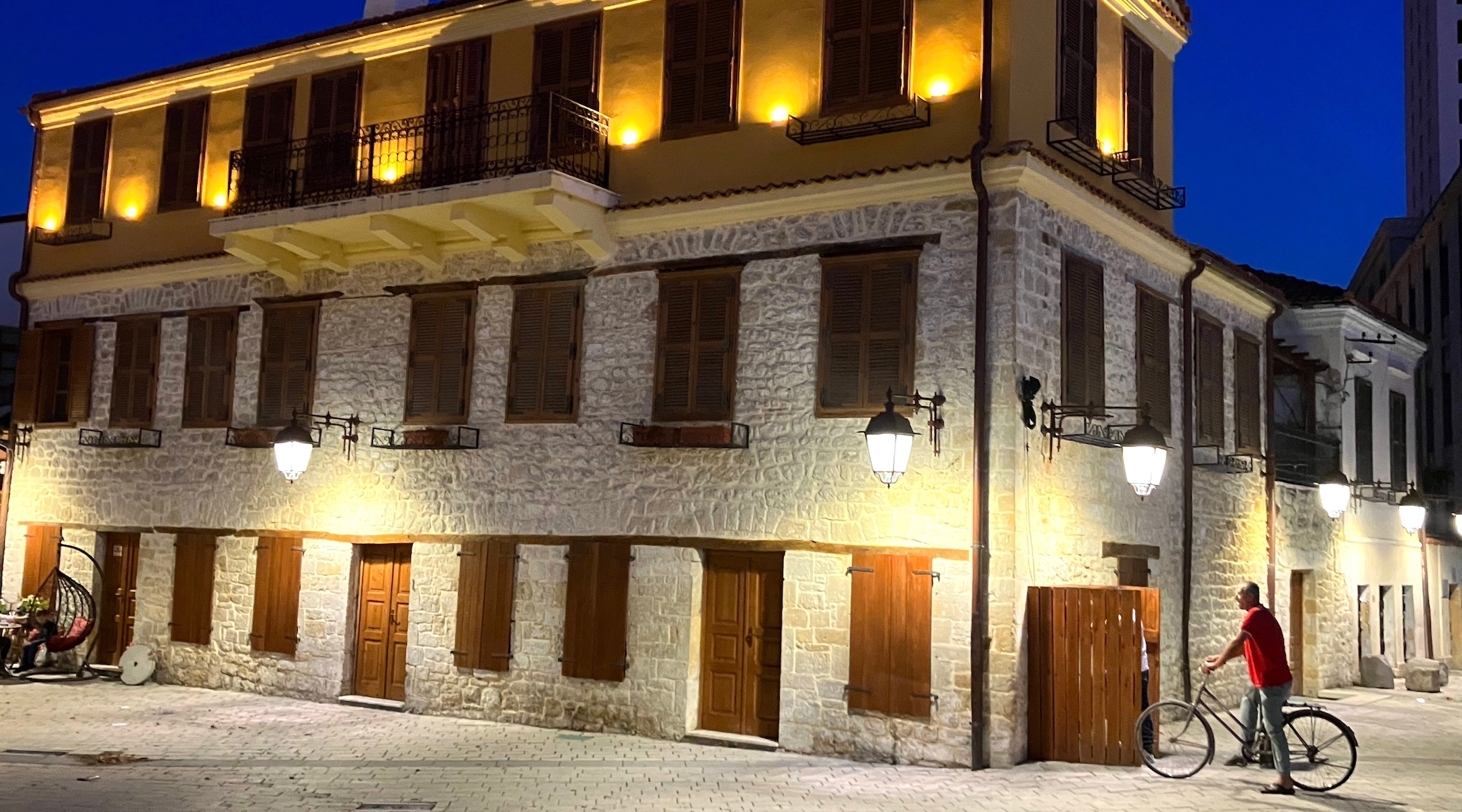
This historic building in the heart of Vlora will soon house the Jewish Museum of Albania. (Larry Luxner)
Prince Leka II — the grandson of King Zog, who ruled Albania from 1928 until fascist Italian occupiers forced him into exile in 1939, never to return — said he was proud that his grandfather allowed Jewish refugees into the country in the 1930s and provided for them.
“He risked his position as king but refused to be a puppet,” Leka explained over coffee at the Maritime Plaza Hotel’s Queen Geraldine Room, which is named after his grandmother. “That’s why he had to leave Albania after the invasion.”
Another prominent Albanian Jew is Geri Kureta, 55, owner of a chain of kids’ clothing and toy stores. He has five outlets in Tirana, one in Vlora and one in the resort city of Durres. For 16 years, Kureta lived in Karmiel, in Israel’s Galilee, but decided to return to his native Albania in 2007. His 82-year-old father and 76-year-old mother are still in Karmiel.
“I am very worried,” said Kureta, who speaks fluent Hebrew. “Everyone knows I have family in Israel, and all of them call and ask me about them. People here see a lot on TV about Gaza. I don’t think Israel has explained itself very well. Of course I blame Hamas, but at the end of the day, it’s a war. Sometimes we don’t have any other choice.”
Blendi Gonjxhi, head of the government office that oversees Albania’s road transport services, told the Jewish Telegraphic Agency that Israel was completely justified in striking back at Hamas after its bloody rampage.
“Things must be seen as they are,” said Gonjxhi. “If you see how much money Hamas spent to prepare for this attack, you’ll understand why Gaza is so poor. You cannot build tunnels and rocket launchers in a crowded neighborhood and then complain that this neighborhood is being bombed, or ask the people you attacked to supply your water and electricity.”
A tale of two museums
When Nazi troops occupied the country, Albania’s inhabitants gave shelter to local Jews as well as refugees, hiding them in their homes, dressing them in native costume and even giving them Muslim names to fool the Germans — in keeping with the tradition of besa. To honor that tradition, Albania is building the Besa Museum, which will be dedicated to the stories of Albanian citizens who saved Jews during the Holocaust.
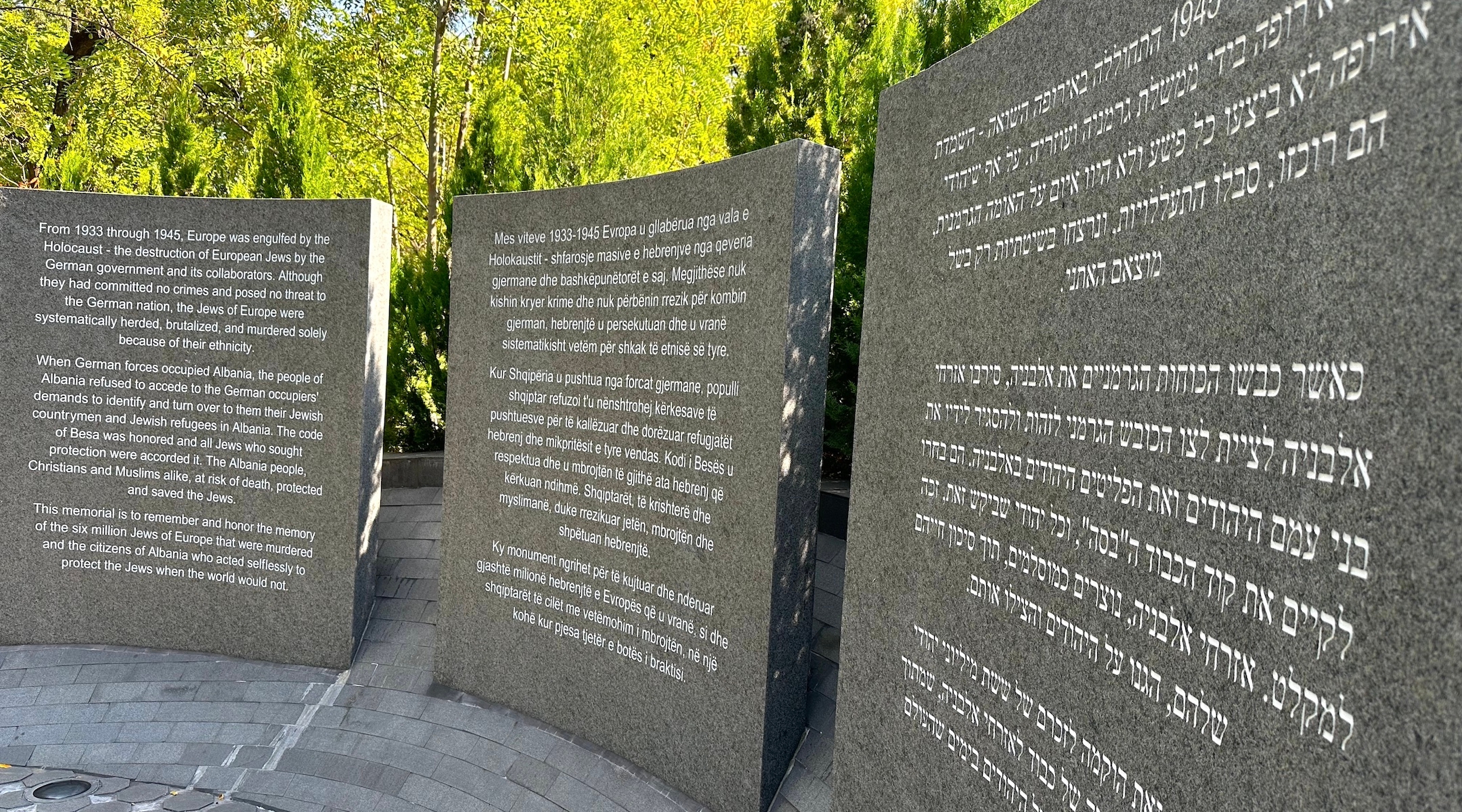
Albania’s national Holocaust memorial, situated in a Tirana park, has commemorative plaques in Albanian, English and Hebrew. (Larry Luxner)
The museum, which will be located in what is now a badly dilapidated mansion in Tirana — was announced in March by Rama during a visit to Jerusalem. But few details are available, and an onsite security guard refused to let a reporter in to take photos of the site.
“For 30 years, I’ve been dreaming of this. I never thought my idea of a Jewish museum would really happen,” said Anna Kohen, a retired New York dentist and author of the autobiographical “Flower of Vlora: Growing Up Jewish in Communist Albania.” Now 78 and living in Florida, she pitched the museum concept to city officials years ago.
Likewise, the 21,000-square-foot Jewish Museum of Albania, slated to open in 2025, will soon rise on the current site of Vlora’s Ethnographic Museum, which is located in the middle of a small plaza. For now, graffiti is scrawled on nearby walls next to the Sophie Caffé and other boutique shops.
The $2.5 million Vlora project is financed by the Albanian-American Development Foundation (AADF) and is being designed by Israeli architect Etan Kimmel, whose Tel Aviv company beat four European firms for the winning bid.
“We’ve always been aware that it was necessary to have something to remind people of the long-term relationship between Albania and the Jews,” said the AADF’s project manager, Alketa Kurrizo. “This will be a 21st-century Jewish museum that talks not only about history and what we have done, but about Albania’s Jewish history going back to medieval times. This museum is one all of us will be proud of, and we’re sure that people from Israel will also come to visit.”
Upon completion, the museum will consist of one underground floor and four floors above ground as a modern glass extension to the existing historic building. Besides a permanent exhibit area, plans call for classrooms, office space, a library and an auditorium.
“This will be our first museum outside Israel,” said Kimmel, whose projects include the National Memorial at Mount Herzl, the Natural History Museum in Tel Aviv and Jerusalem’s Tower of David Museum, as well as numerous Israeli embassies around the world.
Both of the two planned museums are being financed by taxpayers in Albania, which despite a dramatic jump in tourism this year remains one of Europe’s poorest countries. Prince Leka insists it’s crucial for Albanians to know their past in order to prevent future atrocities — particularly in Europe, where violent assaults against Jews and firebombing of synagogues and other Jewish and Israeli targets have skyrocketed since the current war began.
“We have a huge amount of sympathy for Israel today,” he said. “What happened on Oct. 7 was not a military attack, it was a terrorist attack. Armies do not rape women, they do not abuse children. Anyone who justifies these criminal acts is on the wrong side of history.”
Correction: A previous version of this story mistakenly referred to the Albanian-American Development Foundation as the Albanian-American Development Fund.
This article originally appeared on JTA.org.
A message from our Publisher & CEO Rachel Fishman Feddersen

I hope you appreciated this article. Before you go, I’d like to ask you to please support the Forward’s award-winning, nonprofit journalism so that we can be prepared for whatever news 2025 brings.
At a time when other newsrooms are closing or cutting back, the Forward has removed its paywall and invested additional resources to report on the ground from Israel and around the U.S. on the impact of the war, rising antisemitism and polarized discourse.
Readers like you make it all possible. Support our work by becoming a Forward Member and connect with our journalism and your community.
— Rachel Fishman Feddersen, Publisher and CEO

























